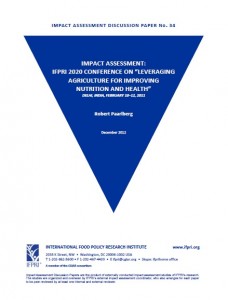 Prior to the 2020 conference, IFPRI commissioned an independent impact assessment report in order to determine the impact of the Conference on individual participants, institutions, and professional discourse. Robert Paarlberg, B. F. Johnson professor of political science at Wellesley College, carried out the assessment, conducting pre- and post-conference surveys, interviews, and web searches over the course of 18 months. The final report has now been released. The impacts can be summarized as follows:
Prior to the 2020 conference, IFPRI commissioned an independent impact assessment report in order to determine the impact of the Conference on individual participants, institutions, and professional discourse. Robert Paarlberg, B. F. Johnson professor of political science at Wellesley College, carried out the assessment, conducting pre- and post-conference surveys, interviews, and web searches over the course of 18 months. The final report has now been released. The impacts can be summarized as follows:
• On individuals: The conference had positive short-term impacts on motivation and capacity for influence, but few changes in beliefs.
• On institutions: The strongest institutional impacts came within institutions that wanted to integrate nutrition into agriculture but were unsure of how, or how quickly, to move forward, such as the CGIAR, and within donor institutions that used the materials and energy generated by the conference to help push and guide a major expansion of bilateral funding into the agriculture-nutrition-health arena. Direct impacts on national governments were small, as were impacts on private sector and NGOs.
• On professional discourse: The conference helped “change the conversation” about agriculture and food security, bringing in more frequent reference to cross-sector impacts on nutrition and health.
The report provides a comprehensive overview of and how the agriculture-nutrition-health landscape is changing since the 2020 Conference as
well as lessons on how organizations can measure the impact of their events and build in monitoring and evaluation into program and event design.

